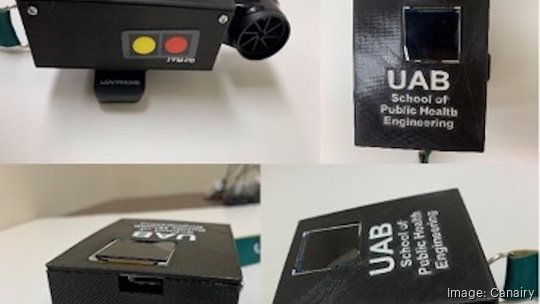
A UAB professor whose research has been funded by multiple government entities, including NASA, is now working to help patients with respiratory diseases.
Maryam Karimi is the CEO and founder of CanAiry, a stand-alone personal wearable monitoring device designed and developed by a group of researchers from the University of Alabama at Birmingham School of Engineering and Public Health. Its aim is to help reduce asthma and other respiratory-related disease emergency room visits and hospital admissions.
CanAiry provides continuous monitoring of users’ health and exposure status in real time and connects the information with their health care provider for early intervention. It is enabled to notify, track and manage for users’ early signs of worsening asthma or Chronic Obstructive Pulmonary Disease through a mobile app and shows maps with high concentrations of pollutants.
"So what normally happens is someone who has COPD or asthma, they're being exposed to high amounts of pollutants today," Karimi said. "It takes anywhere between three to four days to show symptoms. It could be wheezing, coughing, tightness in their chest, and they will normally have to go to the emergency room and get admitted up to seven days and then, normally, not being seen by your own doctor."
Based on CanAiry’s patient trial data, it reduces asthma and COPD risk attacks by 36% and hospital/ER admission by 27%.
Karimi designed the tech, along with Seyedabdollah Mirbozorgi, design officer, and Ross Nazari, chief financial officer. The founders discussed the idea for almost a decade before the company was finally founded in 2020 when it got funding from the UAB Lung Health Center, which was used to develop the device. So far, the company has raised around $200,000 from government grants and the university, and it is gearing up to raise more.
Currently, the founders are working to miniaturize the device. Karimi said they want the device to be fashionable and look something like a Fitbit.
She added that there is especially a need for such a device in a place with air quality issues like Birmingham. In the 2022 “State of the Air” report released by the American Lung Association, Birmingham’s rankings were mixed for some of the most harmful and widespread types of air pollution: particle pollution and ozone, and the city had some of the worst air quality in the Southeast. Respiratory issues were also exacerbated across the nation due to the Covid-19 pandemic.
Karimi said the device is something that health insurance would cover, and the plan is to go the FDA route to make the device more affordable. She said the hope is also for the device to reach fitness and environmental enthusiasts who may be able to use the tech.
As for the next steps in the journey, Karimi, said she is focusing on finding the right people to work with the company as well as the processes of FDA approval, connecting with insurance companies and physicians and getting the tech into the hands of users.
CanAiry has a provisionary and primary patent in place.









